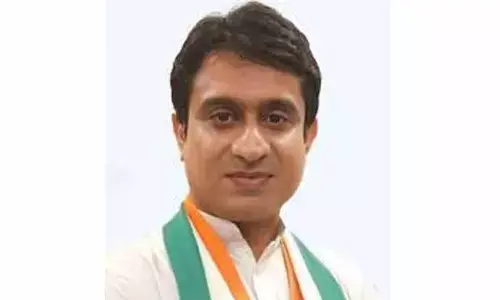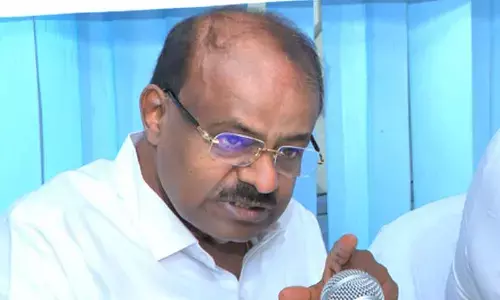English medium in AP degree colleges may not be the best move

English medium in AP degree colleges may not be the best move
The government of Andhra Pradesh took the decision to revert to English medium at degree level from this academic year
The government of Andhra Pradesh took the decision to revert to English medium at degree level from this academic year. As a student of the last batch of graduates who studied in English medium at degree level (1970-73) and as someone who taught the degree students for over three decades both in English and Telugu media I wish to present the good and bad of the sudden shift in the medium of instruction both for students and teachers.
What prompted this sudden shift in the medium of instruction is not known as the press release of AP State Council of Higher Education (APSCHE) contains only instructions to the institutions on the mode of implementation of the new policy and no other details. This reminds me of the situation when the shift was made in instruction to degree students from English to Telugu.
There are many coincidences and similarities in the way decisions were taken then in 1971 and now after 50 years. It was exactly 50 years back in 1971 when the first batch of degree students started their destiny in Telugu medium. In a way they are lucky then as they were already accustomed to Telugu medium. They did their schooling up to then newly introduced SSC (10th Class) certificate and then moved to newly formed Junior Colleges to pursue their 2 year intermediate also in Telugu medium.
Till then students in the high schools were given instruction in Telugu medium up to SSLC (11th Class) and then join the one year Pre-University (PUC) where the medium of instruction was English only. Students coming from rural high schools used to suffer this sudden change in the medium of instruction to English and in the initial years the pass percentage at the PUC used to be low.
It was the anti-Hindi agitation lead by Dravidian parties in then Madras State and political victory of DMK in 1967 elections which shifted the medium of instruction to Tamil there. That was taken as a clue and then Education Minister in AP and a lover of Telugu language P.V. Narasimha Rao went ahead with Telugu medium and creation of Telugu Academy for the production of text books and reference books in new medium.
The then order of the government is similar to the order of the present government. Then the order was "only Telugu medium in all colleges" and now APSCHE sternly says "degree colleges should offer only English medium from the academic year 2020-21".
Similarity in those decisions taken in a gap of 50 years is neither the academicians nor the students have a say in decision making. What those in power thought as beneficial was implemented as that which was suited for the students. Students and parents were not given a choice. Despite the medium of instruction changed to Telugu in 1967 with the hope of bettering the students the pass percentage at the intermediate class was very low in the initial years. The same is the case with the degree level students when the first batch of Telugu medium degree students passed out in 1974.
Part of the reason was the difficulty felt by the teachers to teach in Telugu medium especially with the academy text books which attempted to create Sanskritised technical terms in all streams. Those were the days when teachers used to carry a paper, with the English word and equivalent Telugu academy created word to the class room. Now the scene will be reversed as the current day lecturers were all students of Telugu medium, proficient with the Telugu technical terms, may have to carry a paper with Telugu word and English word.
Under pressure from educated parents and some of the high demand institutions in late 70s the policy got changed from 'Telugu medium only' to the option of both English and Telugu mediums being offered to students. Even then the government orders instructed that first Telugu medium section have to be filled and then they should open the English medium sections.
With the encouragement of private engineering colleges since the early eighties the clamour for technical education grew and the normal degree courses lost its sheen. It is open secret, which no dares to openly concede, that the degree courses are now pursued by those non serious students for whom going to colleges is a 'time pass'. They are enrolling because of the social welfare scholarships and the fees-reimbursement schemes offered by the governments.
Before taking a decision on the compulsory English medium at degree level the APSCHE should have taken the current status of the degree colleges in the state. Most of the aided colleges which served the state for so any decades are now 'dead' colleges because of the apathy of the successive governments. The vacancies have not been filled since last 30 years barring occasional recruitment under backlog category. The colleges in AP suffer in the absence of quality teachers that applies even to the government-run institutions.
All the colleges run on part time/ contractual/ outsourced staff who are working for a paltry sum in the absence of any job openings elsewhere. Quality wise they are not the best to be there to teach the students more so in the proposed English medium. Without the quality human resource there is no way a mere change in the medium instruction from Telugu to English will attain higher level in college education in the state.
There is one advantage in change of the medium to English. The availability of books in English on any given subject are huge. Till now the students have access with only academy published Telugu books and no student of Telugu medium ever ventured to refer standard English text books. With Telugu medium the library visits of the students are very low.
It may be reversed but the question of teachers who can drive them to libraries with the interest in the subject in the class room remains unanswered. The APSCHE which took this bold decision should address the issue of quality of teachers first before thrusting English medium on the students and institutions.








